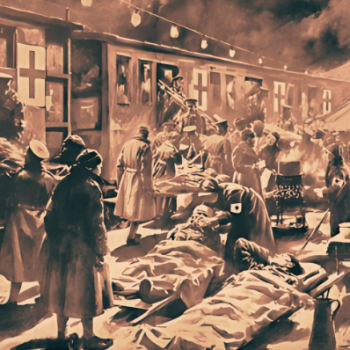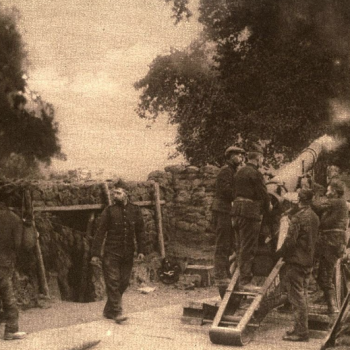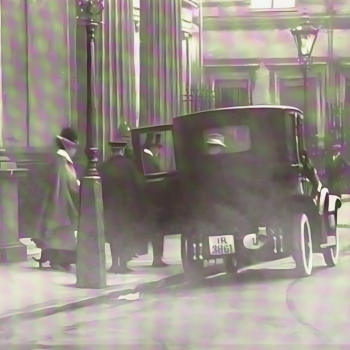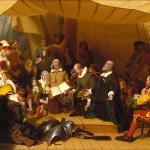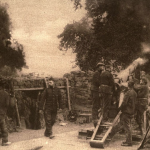EASTERN GLEANINGS
Charles Johnston
July 1889.
The candle pales before the lightning. So do our valleys fade, and our plains become unbeautiful, when the clouds part, and we behold, once in an age, the light-crowned summits of the everlasting hills. The clouds close; and we find our low, unlovely plains, with their dried and withered life, once more around us. We fall again to our daily drudgery, our useless toil; but some memory of the vision remains for us, after the heavens have been once opened, as “a presence that is not to be put by,” working a subtle change, so that we no longer find our narrow world-grave wide enough. We are the true troglodytes, cave-dwellers, though we call our cavern the world. We are gnomes, condemned to forced toils, in the kingdom of darkness. Living for ages in the night-realm, we dream that our darkness is full day.
Once and again, in the midst of the blackness, wonderful, bright vistas flash for a moment before us, awaking thousand light-echoes in the walls of our Erebus: fading again into a deeper night.
Once and again, in the silence, sweet faint fairy songs ring out on the stillness of our night: dying away into a heavier silence and gloom. Once and again, fair glowing colors gleam around us, the opal’s crimson fire, the rainbow flame-drops; only to gleam for a moment and then disappear in the darkness All life is but a perpetual promise; an engagement renewed but never fulfilled.
Man is a king, dethroned, and cast out from his kingdom; in chains and in a dungeon. Yet he is perpetually reminded of his royal estate, perpetually reminded that he has power to be free. But the king is dull, his heart is clogged with heaviness, and he will not listen. The imprisoned monarch dreams his dungeon a palace, his fetters seem chains of gold. Man is the imprisoned monarch, who is bound with fetters; he himself holds the key of the prison, he alone can unloose the fetters. But the king dreams on. The heart of a beggar will not be content with half the universe, says a sage, he is not born to a part, but to the whole. So it is that in the world’s garden blest with the choicest fruit, the most scented flowers; thrilled with the sweetest melodies, fanned by perfume-laden airs; we are silently apprised that there is that which is sweeter than melody, and more joyful than joy.
Our life is the ante-room of the palace where our true treasure lies. The door may be opened in life; it may be opened by death: but there is a death which will not open the door. What is the treasure that lies within? Is it power? or wisdom? or happiness, or love? It is none of these things, and yet it is them all; for it is the life of them: a rare and precious quality, pure essence, whose presence alone gives these things their worth. It is amrita, the joy of the Celestials. Useless to seek to seize the ocean-echo, by clasping the shell in which it lies hid: as useless to try to seize this essence by grasping the form in which for a moment it shone.
“As a bird alights on a branch, and then hops to another branch, so it is with that: it appears for a moment under one form; then under another.”
He who would drink this essence must dare to possess it pure; must willingly throw aside the dust-covered treasures of earth that harbored its flavor before. The secret unconscious conviction that this divine essence exists; this Better than Best is no dream; this is the power that renders endurable life’s long burden of pain, or deadlier still, of monotony. When the gleam of this essence shines forth, amidst the darkness of life, we believe the sorrow of eons a price too small for so splendid a recompense. The first strong day of power repays in full the weakness of ages. But that recompense escapes us; the day of strength does not dawn. The leaden clouds clash together; the fair glimpse of heaven is shut out. Man cries aloud in desolation, a poor captive beating his life out against the bars. Then quietness falls on the struggler’s soul; he learns that the prize may be his, as soon as the price is paid; and he learns that the price is himself.
Two oracles there are, graved in the shrine of the heart. The First: Thou, Man, art the heir to fullness of life. The Second: No life that is bounded can ever satisfy thy soul. In every meeting of mortals, though their brains are stuffed full of all the follies and madnesses of the world; though their hearts and minds are drugged with the dull intoxication of self and sense, there is quite unknown, or hardly suspected by these former, another far different company; august, powerful, beneficent; living with the everlasting laws; breathing the pure air of divinity; watching in silence their mortal companions, and making their presence felt by quiet, scarce-heard monitions in the recess of the heart; gently and steadily leading the weak and uncertain steps of the mortals up the steep path of divinity.
These august immortals are no other than the mortals themselves; as they are now in promise, and as they will one day be in consciousness and life: when man shall have left behind that garment of follies which he, though a divinity, yet consents to wear. Divine apotheosis, long toiled for redemption, when to folly, dullness, and strife shall succeed mutual knowledge and mutual trust; when instead of the sullied desires and thoughts that now disfigure and debase him, man shall have claimed his high hopes and royal duties; when to the impotence and futility of man the mortal shall succeed the power and endurance of man the divinity; when death shall have fled before life, and the grave shall melt away into immortality. On that day the august company of watchers, the strangers unseen in the earthly company, shall have taken the place of the poor actors who now usurp the stage. These divinities that we shall become, will recognize nothing lower than universal aims; with their motives and actions, the mighty sweep of the celestial laws and the galaxies shall be in harmony; their work shall be for truth, and for universal love.
When the silence falls upon us we can hear their voices, pointing out in the quiet light of divine law the true path for us to follow. By these and other pictures, symbols, and metaphors, we seek to express the conviction that this all-too solid looking world, this matter-of-fact earth of ours, with its fields and houses, streets and cities, is not the sum and crown of the universe: but that under this material seeming, lies hid the world of spiritual life, of divine law. That we poor mortals, who can but raise our heads some six feet from the earth, towards the firmament of stars, can nevertheless, raise ourselves into the celestial inner world on which the material universe floats, like foam on a river of pure water; that in the inner world we can hear the music of the eternities, can learn the full richness of the celestial powers that surround us; and perceive the complementary parts of all that seems broken and futile and fragmentary on earth. By these and the like metaphors, we would express the belief, that even in the midst of the follies and madness which surround him on earth, man is yet an immortal god.
That all calculations and human actions and foresights which count him to be less than this, must, either soon or late, be doomed to futility. That all men who see in their fellows less than gods and immortals in the making and who act towards them on this lower assumption, must sooner or later revise their opinions if they would not war with the unconquerable.
All the air resounds with the presence of spirit and spiritual laws. This spirit it is, that, under the myriad illusions of life, works steadily towards its goal; silently, imperceptibly, irresistibly, moving on to divinity. Let us catch the echo from that great ocean, which is borne in upon us, let us divine the working of the true life-spirit; and we can, without fear or apprehension, leave to the guidance of this power the doubtful destiny of our life. Under all the futilities and insanities that fill up our earth life this power is silently at work. These terribly engrossing futilities and trifles are but the veil cast by the great magician over his work. By this glamour of Time are concealed from the weak souls of men, the dark abysses around them; the terrible and mighty laws which incessantly direct their life. These laws penetrate in all their power and mystery to the profoundest immensities of space; they work in their wonder and might through the longest ages of time.
Around us, above us, within us, the forces of spirit are here. As the ice-floes melt before the summer, and the deep oceans beneath come once more to the light of the sun, so shall the seeming realities and stubborn materials of the world melt and dissolve before the silent, unperceived, irresistible advance of the celestial laws, and the world shall once more wear the crown of divinity.[1]
← Table Of Contents →
SOURCES:
[1] Johnston, Charles. “Oriental Gleanings.” Lucifer. Vol. IV., No. 23. (July 15, 1889): 379-382.




